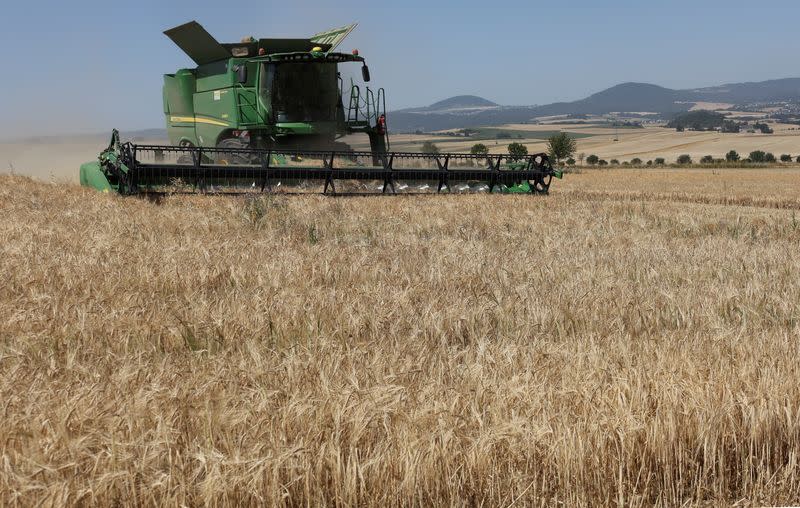Mild spell leaves EU grain crops at risk from cold snap

PARIS (Reuters) - Unusually warm weather in Europe has stirred grain crops from winter dormancy, creating concerns that a subsequent plunge in temperatures could damage fields that have generally been in good condition, analysts said.
Parts of Europe have set record temperature highs for the time of year during a mild spell since late December. Cooler weather is expected next week but temperatures may hold above seasonal norms.
Consultancy Strategie Grains on Thursday increased its forecast of European Union soft wheat production in 2023, saying a bigger planted area and good growing conditions had put the EU on track for a bigger harvest than last year.
But the recent balmy weather has reduced hardiness acquired by crops during a mid-December freezing spell and triggered renewed growth in some plants, according to analysts.
In France, the EU's biggest grain producer, a sudden drop in temperatures could hit well-advanced crops sown before a previous warm spell in October, as well as more delicate varieties like early-sown spring barley, Jean-Charles Deswarte of crop institute Arvalis said.
"We shouldn't be alarmist but the scenario to be feared is one like 2011-2012," he said, referring to the season when a February cold snap caused extensive damage to French grains.
Nearly all French winter wheat and barley were in good condition ahead of winter, according to farm office FranceAgriMer. Regular rain has helped early growth by replenishing soil moisture after severe drought last year.
French farmers have increased the area planted with soft wheat, winter barley and rapeseed, according to the country's farm ministry.
In Germany, the warm conditions have left fields with no protective snow cover, raising worries that crops may suffer from a cold snap after appearing to come through last month's wintry spell unscathed.
“The warm weather means wheat is looking good, but if sudden and deep frosts occur we could have a problem because of the almost total lack of snow,” a German grain analyst said.
"Frosts of minus a couple of degrees can still be shaken off by today’s wheat types but prolonged frosts of below 6-8 degrees could be a worry.”
Germany's winter wheat sown area for the 2023 harvest has been reduced by around 1.9% on the year while winter rapeseed sowings are up by 7.6%, the German national statistics agency estimated last month.
In Poland, there were similar concerns.
“It is exceptionally warm and with almost no snow cover, except for some regions in the south,” said Wojtek Sabaranski of analysts Sparks Polska.
“So crops are fully exposed to frosts.”
Sabaranski estimated Poland’s winter wheat area at just over 2.4 million hectares against 2.3 million hectares in the 2022 harvest.
The winter rapeseed area for the 2023 harvest is expected to be little changed from the 2022 harvest at about 1.05 million -1.08 million hectares.
(Reporting by Gus Trompiz in Paris and Michael Hogan in Hamburg; Editing by Kirsten Donovan)

 Yahoo Finance
Yahoo Finance 